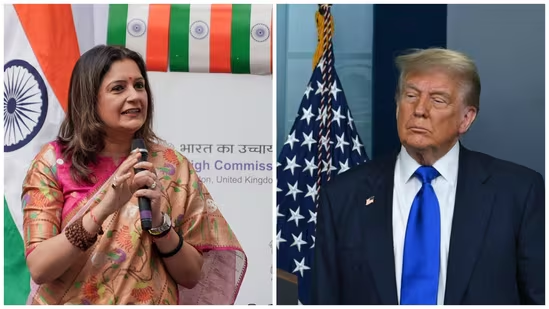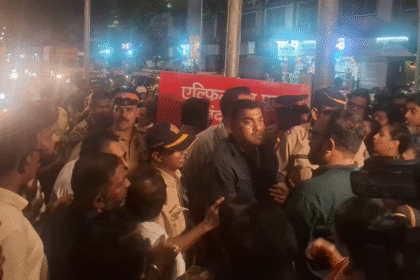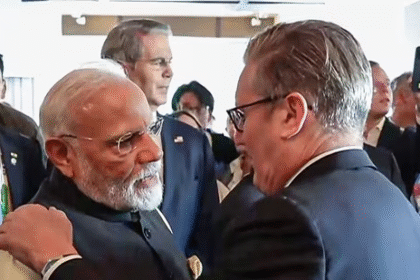The Spark—Trump’s Ceasefire Claim and the Immediate Political Response
On July 18, 2025, former U.S. President Donald Trump reignited a longstanding diplomatic controversy by reiterating his claim that he was instrumental in preventing a full-blown war between India and Pakistan during his tenure. In a public statement, he asserted that jets were “shot down” and that the situation was defused only due to his intervention—a bold narrative that, once again, drew mixed reactions globally. Among the sharpest and most immediate responses was that of Shiv Sena (UBT) MP Priyanka Chaturvedi, who criticized Trump’s assertion as “self-congratulatory fiction,” underscoring the broader sentiment in Indian political circles that Trump’s remarks diminish the sovereignty and strategic agency of India.
Chaturvedi’s rebuke was more than just a rebuttal; it was a reflection of India’s increasing discomfort with global leaders using South Asia’s volatile geopolitics as talking points in their domestic political campaigns. Her statement, which quickly gained traction across Indian and international media, denounced Trump’s narrative as not only misleading but also disrespectful to India’s national security apparatus and its independent diplomatic machinery.
A Recurring Theme in Trump’s Rhetoric
This wasn’t the first time Trump had made such claims. In the past, he has frequently suggested that his administration played a behind-the-scenes role in averting wars, brokering peace, and defusing crises. The 2019 India-Pakistan escalation following the Pulwama terror attack and the subsequent Balakot airstrikes had already been a sensitive chapter in South Asia’s recent history. At that time, Trump had publicly stated that the U.S. was involved in de-escalation efforts—though such claims were never confirmed by the Indian government.
In his latest assertion, Trump once again framed himself as the hero of global diplomacy, saying, “We stopped a lot of wars. You know, they were going to go at it. India and Pakistan were at it. They had their jets shot down. It was going to be bad.” The comment not only drew scrutiny from analysts and journalists but provoked outrage among Indian leaders who believe these statements exaggerate the U.S. role in bilateral issues where India maintains strategic independence.
Chaturvedi’s Rebuttal: A Voice for Sovereignty
Responding promptly via social media and press statements, Priyanka Chaturvedi issued a scathing critique of Trump’s comment. She pointed out the dangerous precedent set by political figures from powerful nations making unverifiable claims about sensitive geopolitical matters involving sovereign states. “India’s diplomacy, restraint, and military preparedness were the defining factors during that crisis—not Trump’s ego trip,” she stated, calling his version of events “a figment of self-aggrandizement.”
Her remarks reflected broader unease in Indian political discourse, especially among leaders and parties that believe India should not be portrayed as reliant on external powers in matters of national defense and regional diplomacy. As a prominent voice from the Shiv Sena (UBT) and a consistent advocate for national autonomy in international affairs, Chaturvedi’s rebuttal was not just political theater—it was a firm restatement of India’s diplomatic ethos.
The Timing: Why Now?
Trump’s comment came amid escalating geopolitical shifts and increasing U.S. media attention on his potential return to the White House in 2024. Analysts believe that Trump, a master of populist rhetoric, invoked the India-Pakistan example to bolster his image as a global peacemaker at a time when his foreign policy credentials are under renewed scrutiny.
However, invoking such claims without diplomatic backing or factual detail has drawn criticism even within the United States. Political observers noted that Trump’s oversimplified narrative ignored the nuance and complexity of India-Pakistan relations and diminished the efforts made by Indian defense and foreign policy institutions in containing the 2019 crisis.
Setting the Stage for Deeper Analysis
The clash between Trump’s narrative and Chaturvedi’s counterpunch encapsulates more than a war of words—it reveals a deepening divide between populist global rhetoric and the grounded realism of regional politics. As India asserts its autonomy on the world stage, leaders like Chaturvedi are increasingly pushing back against attempts to rewrite the geopolitical history of South Asia through the lens of American exceptionalism.
As Priyanka Chaturvedi’s remarks dominated headlines and social feeds, India’s mainstream and digital media outlets swiftly entered the fray. From television primetime panels to independent geopolitical podcasts, the central question emerged: What role, if any, did Donald Trump actually play in the de-escalation of tensions between India and Pakistan in 2019? And more importantly—why does this narrative persist despite India’s repeated denial of third-party mediation?
While former President Trump’s claim that “jets were shot down” and “war was averted” may resonate with certain segments of his domestic base, Indian media and policy experts have repeatedly clarified that the 2019 confrontation was resolved through India’s own calibrated diplomatic channels, not U.S. mediation. The perception in India remains firmly rooted in the belief that its sovereignty in defense and diplomacy is non-negotiable, and this episode reaffirms how external commentary can provoke a defensive yet proud nationalistic response.
The Media Response: From Analysis to Rejection
From The Hindu to NDTV, and from OpIndia to The Wire, nearly every major Indian outlet ran op-eds or discussions evaluating the implications of Trump’s comments. Most pieces agreed on a key point: Trump’s version of events was, at best, an oversimplification—and at worst, an opportunistic distortion.
Editorials in mainstream newspapers highlighted how such claims undermine India’s credibility on the world stage. One analysis argued, “When global leaders appropriate India’s regional military and diplomatic decisions to serve their electoral optics, they do more harm than good. It’s imperative that such claims be met with fact-based rebuttals from Indian leadership.”
Meanwhile, television panels debated the danger of Trump’s narrative shaping international perceptions, especially in politically sensitive regions like South Asia. A former diplomat appearing on CNN-News18 remarked, “What Donald Trump did with that statement wasn’t merely boastful—he misrepresented history and disrespected India’s strategic sovereignty.”
Public Sentiment: Nationalism Meets Political Awareness
Social media platforms became the loudest echo chambers of this debate. On X (formerly Twitter), hashtags like #TrumpLies, #IndiaSovereign, and #ChaturvediCallsOutTrump began trending within hours of her statement. Many users echoed Chaturvedi’s criticism, lauding her for speaking out against foreign leaders who attempt to politicize India’s complex regional dynamics for electoral leverage.
Others took a broader view, seeing Trump’s claim as part of a pattern of American leaders misunderstanding or simplifying South Asia’s complexities. Comments poured in from users across political affiliations—liberal, centrist, nationalist—many of whom agreed that India’s foreign policy achievements must be credited internally, not externally.
A widely circulated post read, “India didn’t need saving. It needed space and strategy. Trump can campaign however he wants, but we won’t let him rewrite our history.”
Historical Context: What Really Happened in 2019
To understand the full backdrop, it’s critical to revisit the real sequence of events in 2019. After the tragic Pulwama attack that killed 40 CRPF personnel, India launched airstrikes in Balakot targeting terror camps. This unprecedented move marked a significant departure from India’s traditionally restrained responses. In retaliation, Pakistan attempted to strike Indian military targets, and both nations claimed to have shot down each other’s aircraft. One Indian Air Force pilot, Abhinandan Varthaman, was captured by Pakistan and later returned—a moment seen as a diplomatic victory for India.
While there was international pressure, including statements from the U.S. urging restraint, India never acknowledged third-party mediation. In fact, India has historically rejected any external role in resolving the Kashmir dispute or other bilateral issues with Pakistan. The Ministry of External Affairs (MEA) maintained that the return of the pilot and the eventual cooling of tensions were results of India’s sustained engagement and its superior diplomatic and military positioning.
This context starkly contradicts Trump’s simplified version of events. And when political figures like Chaturvedi push back, they are not just defending India’s pride—they are defending the integrity of historical truth.
Broader Diplomatic Implications: U.S.-India Relations
The U.S.-India relationship has grown stronger over the last two decades, built on strategic alignment, trade cooperation, and shared democratic values. However, Trump’s latest claim reintroduces the uncomfortable legacy of foreign paternalism—a relic from the Cold War era when India was often viewed as a “project” in need of guidance or intervention.
By asserting a savior role in a regional conflict where India considers itself a major stakeholder, Trump inadvertently revives the very condescension that modern Indian diplomacy seeks to escape. While the Biden administration has worked to reset tone and optics with New Delhi, Trump’s interjections remind Indian analysts that U.S. foreign policy narratives are often influenced more by domestic political calculus than actual events on the ground.
A Disputed Narrative Takes Root
Donald Trump’s claim may have been made casually, but its reception in India has been anything but. From Parliament members to press editors, and from former diplomats to the average citizen, the collective reaction reveals a nation deeply conscious of how it is represented abroad—especially in moments of crisis.
As global political discourse evolves in the digital age, a powerful trend has emerged—the weaponization of historical narratives by populist leaders for electoral or ideological gain. Donald Trump’s recent remarks suggesting he singlehandedly stopped a war between India and Pakistan reflect more than just boastful political theater; they are emblematic of a broader phenomenon where nationalist leaders reshape diplomatic events to reinforce their persona as global strongmen.
In this part, we explore how Trump’s storytelling style fits within his broader political strategy, compare it to similar leaders around the world, and unpack the risks such reinterpretations pose to international relations—especially when facts become secondary to political convenience.
The Trump Doctrine of Narrative Ownership
From the moment he descended the Trump Tower escalator in 2015 to announce his candidacy, Donald Trump positioned himself as a leader who defied traditional diplomacy and told it like it is. But in truth, Trump doesn’t just “tell it”—he rewrites it.
Whether it was claiming credit for denuclearizing North Korea (despite no such outcome), reshaping NATO policy through sheer will (overlooking years of groundwork by allies), or now declaring himself the peacemaker in South Asia, Trump’s strategy revolves around narrative ownership. He believes that by framing global incidents in terms of his intervention, he not only projects dominance but also creates emotional resonance with his base, many of whom perceive foreign affairs through a lens of American exceptionalism.
His India-Pakistan ceasefire claim is no outlier. It follows a script where:
- Complex international events are reduced to binaries—war or peace, chaos or calm—with Trump cast as the sole stabilizer.
- Regional actors are sidelined, and their contributions omitted or diminished.
- Media reports and diplomatic communiqués are discredited if they challenge his version of events.
Such a model thrives not on accuracy but repetition and emotional framing, especially in election years.
Populism and Foreign Policy: A Global Snapshot
Trump is not alone in this tactic. Leaders across continents have increasingly begun to deploy simplified or altered foreign policy narratives to boost domestic approval. Consider:
- Recep Tayyip Erdoğan in Turkey, who frequently links military operations in Syria and Iraq to national pride and Ottoman legacy.
- Viktor Orbán in Hungary, who rewrites migration crises as existential threats orchestrated by Western liberalism.
- Narendra Modi in India, who has, at times, strategically evoked cross-border tensions to reinforce India’s strong stance under his leadership—though without altering the factual basis of events.
What binds these examples is the appeal to sovereignty, strength, and moral clarity—themes that resonate with nationalist voters but often distort the real diplomatic dynamics at play.
Trump’s assertion that he “stopped a war” is thus part of a global populist playbook, where foreign policy is not a realm of negotiation and nuance, but of personal triumph and ideological drama.
Rewriting Diplomatic History: Risks and Ramifications
Why does it matter if a former president takes credit for an event whose actual resolution involved multiple actors and sensitive diplomacy?
Because such mischaracterizations ripple far beyond campaign rallies. When a world leader, current or former, offers a distorted account of geopolitical incidents:
- It undermines the agencies of regional powers—in this case, India’s own decision-making and strategic depth.
- It weakens trust between nations, especially when those narratives gain traction among global audiences unfamiliar with the full context.
- It creates a precedent where diplomacy becomes performance, and historical events are filtered through political ambition rather than archival truth.
In India’s case, where foreign policy is viewed as a sovereign domain unaffected by external dictation, Trump’s repeated interjections pose an uncomfortable challenge. They force Indian diplomats and politicians to respond to speculative narratives, often distracting from more pressing regional agendas.
Moreover, they place Indian opposition leaders like Priyanka Chaturvedi in a difficult spot—balancing criticism of foreign politicians with internal political alignment.
The Role of the Indian Diaspora and Global Perception
Another critical dimension of Trump’s claim involves the Indian-American diaspora, a politically active and influential community in the U.S. Many within this group supported Trump in 2020 and remain loyal, citing his closeness with PM Modi and tough stance on China and Islamic extremism.
When Trump projects himself as the stabilizing force between India and Pakistan, it appeals to sections of this diaspora who prefer a hardline posture on regional conflicts. But it also creates friction between perceived allegiance to the U.S. and respect for India’s diplomatic autonomy.
This dichotomy complicates the public discourse—especially in an election season where Indian-American votes could swing key states. It raises the question: Can admiration for a foreign leader coexist with nationalistic pride in one’s home country’s independent diplomacy?
Narrative as Strategy, Not Error
Trump’s repeated claim of “stopping a war” between India and Pakistan is not a slip of memory or hyperbole—it is a deliberate political strategy, designed to present him as a global peacemaker, even when facts suggest otherwise. It fits a global pattern where populist leaders leverage foreign policy events not as historical realities, but as storytelling instruments in their own myth-making.
As India’s politicians, journalists, and public push back against this reframing, they confront more than just one man’s statement—they push back against a rising tide of personalized diplomacy, where leaders seek credit for consequences far beyond their actual influence.
India’s Strategic Silence and the Diplomacy of Denial
In the world of international diplomacy, what is not said often carries as much weight as public statements. Since Donald Trump’s repeated assertions that he “stopped a war” between India and Pakistan, the Indian government has chosen to neither confirm nor directly contest his version of events. This strategic silence is telling—and in this part, we analyze why India refrains from aggressively correcting Trump, how this restraint reflects traditional diplomatic posture, and what it signals about New Delhi’s evolving foreign policy doctrine.
The Art of Silence in Indian Foreign Policy
India’s foreign policy apparatus, especially under Prime Minister Narendra Modi, has adopted a “speak softly, act decisively” approach when dealing with external powers, particularly the United States. Trump’s bombastic claim, though widely seen as exaggerated, has not elicited a formal rebuttal from the Ministry of External Affairs (MEA).
This silence is not necessarily an endorsement; rather, it is a calculated response grounded in three strategic imperatives:
- Preserving Bilateral Ties:
India views the U.S. as a vital strategic partner in countering China, advancing technology cooperation, and supporting global diplomatic ventures like the Quad. Publicly disputing a former U.S. President—especially one with a strong voter base—could risk politicizing the Indo-U.S. relationship, which New Delhi prefers to keep bipartisan. - Avoiding Electoral Entanglement:
With the U.S. heading toward its next presidential election cycle, Indian officials are cautious about becoming fodder in domestic American politics. Responding to Trump could entangle India in a Republican vs. Democrat narrative, undermining its long-standing principle of non-alignment in foreign political systems. - Letting the Media Handle It:
Indian politicians like Priyanka Chaturvedi, commentators, and retired diplomats are informally countering Trump’s assertions. This outsourced rebuttal mechanism allows the Indian state to retain deniability while still ensuring that its viewpoint enters public discourse.
Chaturvedi’s Comment: More Than Political Snark
When Shiv Sena (UBT) leader Priyanka Chaturvedi took a dig at Trump for his claim, it was initially seen as a routine political jab. But in a broader context, her response serves as a proxy articulation of national sentiment, especially since opposition leaders often reflect concerns that the government chooses not to voice publicly.
By mocking Trump’s self-declared heroism, Chaturvedi performed three critical functions:
- She signaled India’s awareness and rejection of such narratives without provoking diplomatic fallout.
- She reaffirmed Indian agency in conflict prevention, indirectly reminding global observers that India is no passive recipient of Western intervention.
- She contributed to the media ecosystem’s self-correcting mechanism, wherein elected representatives and journalists push back on distortions through commentary, satire, and editorial work.
South Asia’s Volatile Optics: Why Narratives Matter
South Asia remains one of the most militarily sensitive regions globally. When a high-profile global figure like Donald Trump invokes the India-Pakistan conflict and credits himself for defusing it, the implications are more than symbolic.
- Narrative Distortion Can Trigger Real-World Escalation:
If Trump’s statements are perceived as accurate by international observers, they may embolden Pakistan to exaggerate the U.S. role in subcontinental diplomacy. This risks undermining India’s consistent line that its security issues—especially relating to cross-border terrorism—are internal matters. - Domestic Perception Management:
Within India, particularly among younger citizens shaped by digital content, repeated foreign narratives (especially when unchallenged) can create long-term misunderstandings about India’s sovereign control over its own affairs. Governments know this, which is why opposition voices like Chaturvedi’s become vital counterweights. - Undermining International Institutions:
Trump’s casual mention of his alleged peacemaking effort sidelines official channels such as the United Nations, the U.S. State Department, or regional summits. It reduces complex diplomatic engagements to informal, backroom anecdotes, weakening institutional credibility.
The Role of Indian Media in Narrative Correction
One of the most important evolutions in India’s democratic maturity is its media’s ability to question both internal and external misinformation. Following Trump’s remark, several Indian outlets—from legacy publications to digital platforms—quickly published articles dissecting the claim and providing historical timelines that refuted the former president’s version.
This organic pushback has had the following effects:
- It shielded the government from needing to respond officially while ensuring the public received a corrected version of events.
- It internationalized the Indian perspective, with global outlets picking up stories from Indian media and quoting rebuttals from local experts.
- It upheld narrative sovereignty, where India tells its own story rather than letting it be defined from abroad.
Rewriting vs. Remembering: The Battle for Historical Integrity
At its core, the Trump-Chaturvedi episode is about who gets to write history. In a digital world where social media memory often supersedes official archives, the battle between political spin and historical fact is more contested than ever.
India’s response—quiet, measured, but underpinned by strong unofficial voices—illustrates a sophisticated balancing act. It reflects a democratic system where multiple actors—not just the state—shape public memory and protect national dignity.
Diplomacy in the Age of Misinformation
India’s strategic silence over Donald Trump’s ceasefire claim is not an oversight—it is diplomacy by design. Through non-engagement, indirect rebuttals, and media leverage, New Delhi has chosen to neutralize misinformation without escalating political friction.
Leaders like Priyanka Chaturvedi play an increasingly important role in this structure, offering sharp, often humorous interventions that carry the weight of national perspective without the burden of diplomatic protocol.








